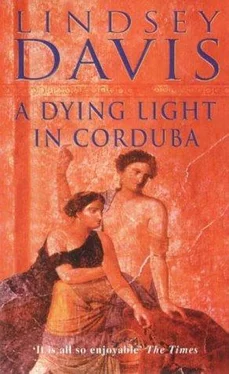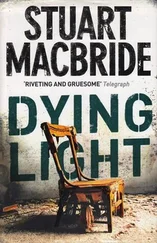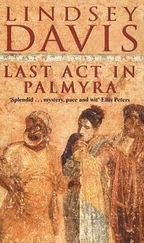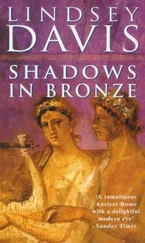Lindsey Davis - A dying light in Corduba
Здесь есть возможность читать онлайн «Lindsey Davis - A dying light in Corduba» весь текст электронной книги совершенно бесплатно (целиком полную версию без сокращений). В некоторых случаях можно слушать аудио, скачать через торрент в формате fb2 и присутствует краткое содержание. Жанр: Исторический детектив, на английском языке. Описание произведения, (предисловие) а так же отзывы посетителей доступны на портале библиотеки ЛибКат.
- Название:A dying light in Corduba
- Автор:
- Жанр:
- Год:неизвестен
- ISBN:нет данных
- Рейтинг книги:3.5 / 5. Голосов: 2
-
Избранное:Добавить в избранное
- Отзывы:
-
Ваша оценка:
- 80
- 1
- 2
- 3
- 4
- 5
A dying light in Corduba: краткое содержание, описание и аннотация
Предлагаем к чтению аннотацию, описание, краткое содержание или предисловие (зависит от того, что написал сам автор книги «A dying light in Corduba»). Если вы не нашли необходимую информацию о книге — напишите в комментариях, мы постараемся отыскать её.
A dying light in Corduba — читать онлайн бесплатно полную книгу (весь текст) целиком
Ниже представлен текст книги, разбитый по страницам. Система сохранения места последней прочитанной страницы, позволяет с удобством читать онлайн бесплатно книгу «A dying light in Corduba», без необходимости каждый раз заново искать на чём Вы остановились. Поставьте закладку, и сможете в любой момент перейти на страницу, на которой закончили чтение.
Интервал:
Закладка:
Permits to use the cursus publicus are not readily available. They have to bear the Emperor's personal signature; that's their validation. Governors of provinces are supplied with a finite number, which they are supposed to use only in the proper circumstances. Prissy ones actually write home to check whether they are following the rules. But the clerks of the proconsul of Baetica decided that their man would approve one for me, without being put to the trouble of knowing he had done it. Nice lads.
I usually go on foreign missions already equipped with my own pass. I had not thought about it this time, and neither had Laeta – assuming he possessed the authority to give me one. I had been trying not to think about Laeta. But when I did, I asked the clerks whether he had become the official point of contact for intelligence issues.
'No, it's still supposed to be Anacrites, Falco.'
'Isn't that typical! I left Anacrites on his deathbed. He must have been formally replaced by now.'
'Well, nobody tells us – unless Rome's decided to leave a corpse in charge!'
'Believe me, lads, you won't notice any difference if they replace the Chief Spy with a stiff.'
'Suits us!' they giggled. 'We hate getting letters from him. The old man always goes on the rampage because he can't understand what Anacrites is on about. Then if we send for clarification we get the same message back, only not just in cypher; all the references are changed to code names as well.'
'How about Laeta? Have you noticed an increase in the volume of messages from him? More urgent signals, perhaps?'
'No more than usual. He can't use signals.'
'Why? No entitlement?'
'He writes too much. The beacon flares can only send one letter at a time; it's too slow for long documents.' Too inaccurate as well; you need night-time, with exactly the right visibility, and even then every time a message is transmitted between watch-towers there is a risk that the signallers may misread the lights and pass along gobbledegook. 'Laeta sends scrolls, always via the dispatch-riders.'
'No sign of him having new responsibilities, then?'
'No.'
'I don't suppose he's bothering to enquire after me?' 'No, Falco.'
There was something I wanted to check up on. I gazed at them in a frank and friendly manner. 'I'm asking because if Anacrites is laid up or dead, there may be changes on the Palatine… Listen, you know how I came out to Baetica with a letter for the proconsul saying I was a man on a secret mission?' They were bound to know; there was no harm in sharing the confidence. 'The old man told me you had already been asked to note the presence of another person nobody talks about?' They glanced at each other. 'I'm getting worried,' I told them, lying well. 'I think an agent might have gone missing. With Anacrites lying prone we can't find out who he had in the field.'
More obvious looks were now being exchanged. I waited. 'Letters of introduction from the Chief Spy's office carry the top security mark, Falco.'
'I know. I use it myself.'
'We are not allowed to read them.'
'But I bet you do!'
Like lambkins they agreed: 'Just before you came Anacrites sent one of his coded notes. It was his normal nutter's charter: the agent would not be making contact officially – yet we were to afford full facilities.'
'I bet you thought that was about me.'
'Oh no.'
'Why not?'
'The agent was a woman, Falco.'
'Well, you'll enjoy facilitating her!' I had grinned, but I was groaning inside.
Anacrites ought to have been planning to send out Valentinus. He was definitely working on the case and Momus, my crony at the Palace, had told me Valentinus had been the best agent Anacrites used. Why send a female? Well, Valentinus was a freelance, his own master. Perhaps he had refused to work abroad. That surprised me though. All I knew of him – not much, admittedly – had suggested he was a calm, efficient type who would not balk at anything. Most people welcome the offer of a free long- distance trip.
Surely even Anacrites hadn't fallen for the old belief that respectable businessmen like the oil producers of Baetica were likely to be seduceable? The ones I had met might possibly be so – but they were too long in the tooth to be blackmailed about it afterwards.
Maybe I had been living with Helena Justina for too long. I had grown soft. My natural cynicism had been squeezed out. I had forgotten that there will always be men who can be lured into pillow confessions by a determined dancing girl.
Just as I left I asked another question: 'What do you think about the new quaestor? What are your views on Quadratus?'
'A bastard,' my allies assured me.
'Oh go on. A quaestor is always a bastard; that's how they're defined. Surely he's no worse than the rest of them? He's young and jumped-up – but you've seen it all before. A few months with you showing him how the world works and he'll be all right, surely?'
'A double bastard,' the lads reiterated solemnly.
One thing I always reckon in the marbled halls of bureaucracy is that the best assessments of personalities come from the clerks they kick.
I went back and sat down. I laced my fingers and leaned my chin on them. First the proconsul had taken the initiative to show he entertained doubts about Quadratus, and now these characters openly despised him without giving him a trial. 'Tell me? I said. So being obliging friends of mine, they did.
Quinctius Quadratus was not entirely clean. His personal record had preceded him to Baetica, and although it was confidential (because it was), it had been pored over by the secretariat: there was a bad story, one that Quadratus would find hard to shake off in his future career. On his route to the Senate in his late teens he had served as a military tribune. Posted to Dalmatia he had been involved in a messy incident where some soldiers attempting to reinstate a bridge on a flood-swollen river had lost their lives. They could have waited until the torrent abated, but Quadratus ordered them to tackle the job despite the obvious risk. An official enquiry had deemed the affair a tragic accident – but it was the kind of accident whose details his old commanding officer had bothered to pass on personally to the proconsul who was just inheriting Quadratus in a new civil post.
So there really was a black mark against his name.
Shortly afterwards, I had finally reached the corridor when I noticed some early arrivals queuing for an interview with the proconsul. A scribe who must be senior to the other men – because he had sauntered in even later and with an even worse air of being weighed down by a wine headache – had been waylaid by two figures I recognised. One was the elderly oil magnate, Licinius Rufius, the other his grandson Rufius Constans. The youth was looking sullen; when he spotted me he seemed almost afraid.
I overheard the senior clerk say the proconsul would not be available that day. He gave them some good reason; it was not just a brush-off. The old man looked irritated, but was accepting it reluctantly.
I nodded a courteous greeting to Licinius, but with a long hard ride ahead of me I had no time to stop. I took the road to Hispalis with problems cluttering my mind.
Most puzzling was the female agent Anacrites had intended to send to Baetica. Was she the 'dangerous woman' he had been muttering about? Then where was she? Had he ever actually given her orders? When Anacrites was attacked, had she stayed in Rome without further instructions? Or was she here? Here perhaps even on her own initiative? (Impossible; Anacrites had never employed anyone with that much gumption.)
The female agent had to be identified. Otherwise she might be the dancer I was pursuing. I might have drawn all the wrong conclusions about Selia. She could have been at the dinner as backup for Anacrites and Valentinus; she could be innocent of the attacks; she could have dropped her arrow in the street during a meeting with them; the wounds on the two men could have had some other cause. If so, what was she up to now in Corduba? Had she been dressed as a shepherdess at the Parilia parade in order to follow up the cartel? Had she then disguised herself as an old woman to try and interview Licinius Rufius? Were she and I all along working for the same ends? – Well then, who was the real attacker of Valentinus and Anacrites?
Читать дальшеИнтервал:
Закладка:
Похожие книги на «A dying light in Corduba»
Представляем Вашему вниманию похожие книги на «A dying light in Corduba» списком для выбора. Мы отобрали схожую по названию и смыслу литературу в надежде предоставить читателям больше вариантов отыскать новые, интересные, ещё непрочитанные произведения.
Обсуждение, отзывы о книге «A dying light in Corduba» и просто собственные мнения читателей. Оставьте ваши комментарии, напишите, что Вы думаете о произведении, его смысле или главных героях. Укажите что конкретно понравилось, а что нет, и почему Вы так считаете.












